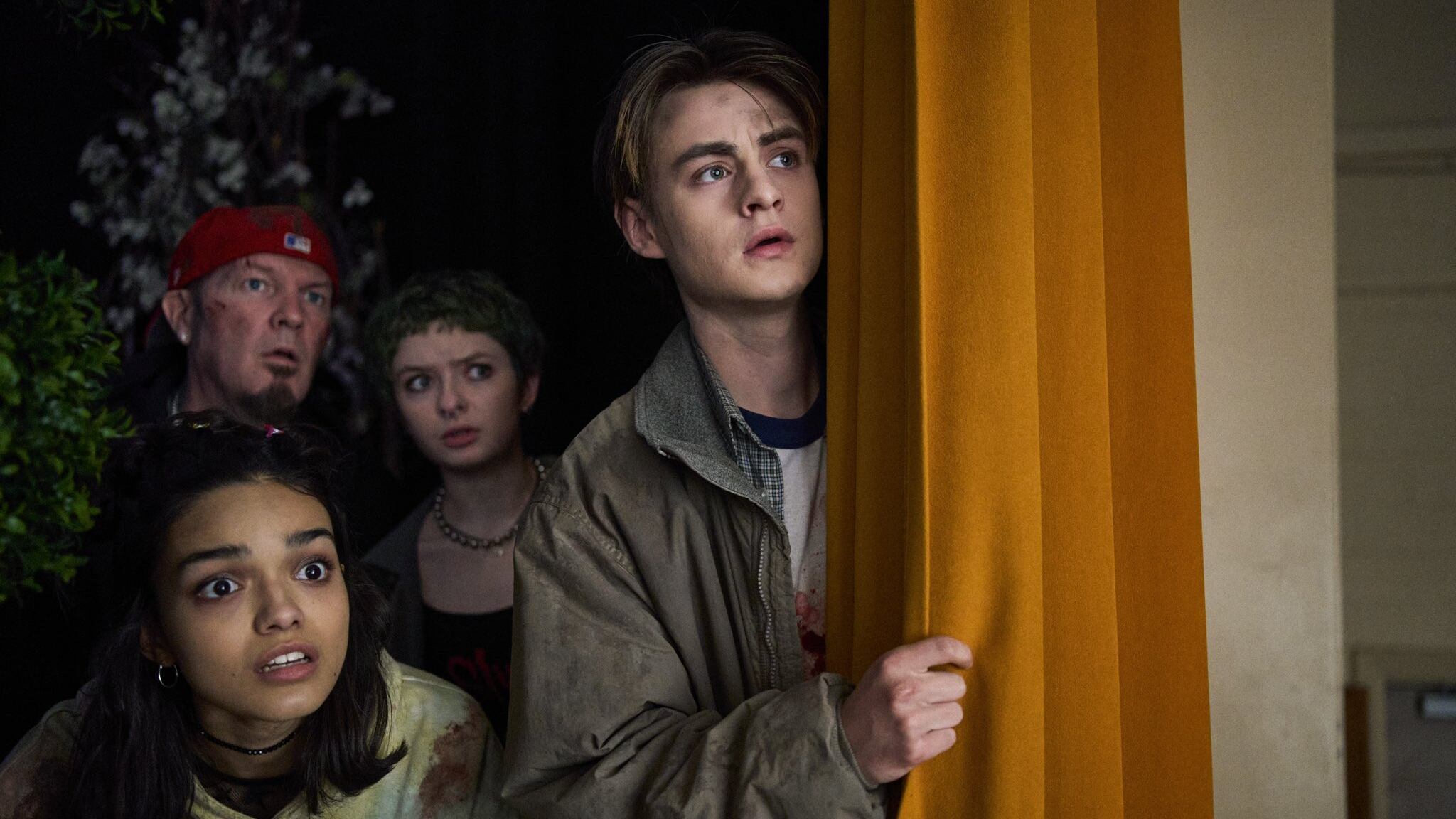Y2K
Do you fondly remember Can’t Hardly Wait’s release in 1998? Did you geek out a decade ago when This Is the End seemingly featured every celebrity cameo imaginable? Kyle Mooney and Evan Winter wrote the film baby of these movies, Y2K. The A24 horror-comedy follows high school besties Eli and Danny (Jaeden Martell, Julian Dennison) through the last days of 1999 to a house party. The opening half hour immerses viewers so deeply in the late 20th century with Tamagotchis, burned CDs and a video rental store that one might forget that the foretold Year 2000 Problem still looms—and in this movie, comes true, albeit to exaggerated heights. Familiar territory can be comforting and frustrating as Mooney directs an historic moment for today’s audience, many of whom are too young to remember it if they were even alive for it. Y2K adds survival horror to a world of high school hookup tropes well-worn even 25 years ago. Alicia Silverstone guides her nerdy screen son Eli to popularity, and Fred Durst’s extended third act cameo was a hilarious surprise. Running just over 90 minutes, Y2K is silly and sweet enough to offer something for everyone to enjoy. R. RUDY VALDEZ. Cinemark and Regal locations.
Carry-On
Ever since Die Hard became the marginally-Christmas-movie hill the internet chose to die on, the floodgates opened for all sorts of almost undetectably Yuletide movies to flood streaming platforms. Released Dec. 13, the airport thriller Carry-On is fresh off the Netflix assembly line in this spirit, and will hopefully be packed up with the yard lights by January. Bland TSA agent Ethan Kopek (Taron Egerton), his not-a-stewardess girlfriend Nora (Sofia Carson, who unhelpfully resembles Anora’s Mikey Madison) and their airport coworkers get caught in a web of intrigue as assassins infiltrate LAX. It doesn’t really matter why. The plot progresses because it has to. Dean Norris does his classic cop character again. Jason Bateman still doesn’t know what to do with his hair, spending most of the movie as a condescending voiceover taunting Millennial Ethan with boring Boomer complaints repackaged as Gen X self-assuredness. Carry-On writer T.J. Fixman comes from the video game world through the Ratchet & Clank franchise, so while the puzzles he thrusts Ethan into seem rewarding enough at first to keep viewers invested, the one-dimensional characters and lack of awareness around how airports work—to say nothing of the shameless bootlicking throughout—turn Carry-On into an immediately forgettable holiday hatewatch. PG-13. ANDREW JANKOWSKI. Netflix.
Maria
Riding the elegant coattails of Jackie (2016) and Spencer (2021), Maria marks the third in director Pablo Larraín’s unofficial trilogy of portraits of 20th century queens in gilded cages. Maria Callas (Angelina Jolie) wore every possible Italian superlative one could bestow upon the world’s most virtuosic opera singer. In 1977, a retired Callas is passively imprisoned in her Paris apartment by unfriendly press and a battery of prescription drugs despite testing her vocal cords for a comeback. As with Lady Di and Jackie O, Maria is shrouded in death—Callas lies cold in the opening shot. These movies share the historical connective tissue of shipping magnate Aristotle Onassis, lover to both Maria and Jackie (Di wasn’t a fan), not to mention Larraín’s abiding passion for gorgeous soft focus, natural light, palatial rooms and kind commoners asking these inscrutable women, “but how are you … really?” Jolie is excellently intense when fixing her knowing gaze on waiters and self-disclosing with utter candor (“My life is an opera, and opera has no reason,” she tells her doctor). The film willfully plays with audience expectations that this lioness in winter will bring the house down one last time. Unfortunately, just construction-wise, when Maria’s catharsis depends on Jolie lip-syncing, the ceiling on the performance is lower than the one in Calles’ apartment. Larraín and screenwriter Steven Knight (who also wrote Spencer) feel equal parts too comfortable and too distracted, fixating on film stock fascinations—Larraín showily switches from 16mm to 8mm in flashbacks and hallucinated documentary sequences—and screenwriting tricks about miscarriages and ex-lover’s deaths that answer questions we didn’t have. The literal diva of her day held precious few secrets from herself, so why all the sideways attempts at revelation? R. CHANCE SOLEM-PFEIFER. Netflix.
The Lord of the Rings: The War of the Rohirrim
One of the most iconic sequences of Peter Jackson’s The Lord of the Rings trilogy is The Two Towers’ climactic Battle of Helm’s Deep, an epic fantasy warfare portrait which sees an alliance of men and elves defend a castle full of refugees from a siege of orcs. But have you ever wondered how Helm’s Deep got its name? Probably not, but the anime prequel The War of the Rohirrim nevertheless answers that question and little else. What could have explored J.R.R. Tolkien’s groundbreaking world from a new perspective instead reveals a naked cash-grab with nothing to say and too much time to not say it. 183 years before Bilbo found the Ring, King Helm Hammerhand (Brian Cox) and his headstrong daughter Héra (Gaia Wise) defend the Kingdom of Rohan from a Dunlending barbarian uprising led by the vengeful nobleman Wulf (Luke Pasqualino). These armies’ clashes are the film’s only saving grace as director Kenji Kamiyama blends 2D figures with 3D backdrops to create a fluid approach to filming warfare. Between those setpieces are interminable scenes of one-note characters exchanging bland dialogue only occasionally spiced up by keywords from Tolkien’s glossary. The personality and humanity that elevated Jackson’s adaptation into legendary status are gone. Actors struggle mightily to elevate a script that could just as easily be any other medieval fantasy if not for the occasional orc or oliphaunt. Anime fans might find something redeemable here, but The War of the Rohirrim adds nothing to either Tolkien’s books or Jackson’s films, standing instead as a testament to cynical studios milking franchise IP for all its worth. PG-13. MORGAN SHAUNETTE. Cinemark and Regal locations.

